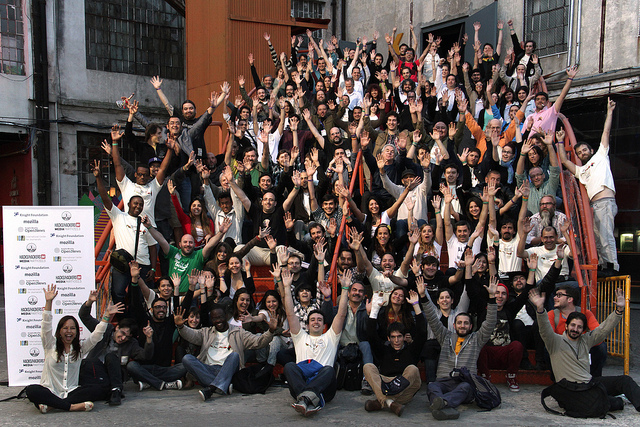
World’s largest “media party” propels a new era of innovation
The following blog post is written by Patrick Butler, vice president of programs at the International Center for Journalists. It is cross-posted from the International Center for Journalists’ blog. Photo credit: Flickr user Ramiro Chanes.
Nearly 1,000 journalists, designers and technologists gathered in Buenos Aires in late August for what Dan Sinker, director of Knight-Mozilla Open News, called “the world’s largest event of Hacks/Hackers in the history of this organization.”
ICFJ’s Knight International Journalism Fellow in Argentina, Mariano Blejman, organized the “Media Party.” Blejman founded that country’s chapter of Hacks/Hackers, which now has nearly 2,800 members. Hacks/Hackers brings together journalists and technologists to work together to develop new digital strategies for gathering and disseminating information.
Sinker brought all eight of his Knight-Mozilla Open-News Fellows, who are embedded in news organizations around the world. They work on specific projects at news outlets from The New York Times to the BBC to La Nación in Buenos Aires. They were among 30 international experts who attended, including representatives of NPR, SourceFabric, the Global Editors Network and the Knight Lab at Northwestern University.
Besides Blejman, three Knight International Journalism Fellows attended. The Fellows gave presentations on their projects and led workshops. Attendees learned everything from designing good mobile applications to using Document Cloud to extract and analyze valuable information from documents for news reports.
Knight Fellow Mariana Santos focused on graphic animation, including a stunning project she helped design at Chile’s La Tercera newspaper for the 40th anniversary of the Pinochet coup. She also promoted Chicas Poderosas, her campaign to bring more women into tech jobs in Latin American newsrooms. Knight Fellow Miguel Paz showed how news organizations can use his website Poderopedia to map the connections between government and business.
Blejman launched his new project, Media Factory, at the event. The media “accelerator” will provide $75,000 in seed funding to promising online journalism startups across Latin America. Recipients will also receive mentoring on everything from technology to business plans. He and Paz led a workshop on Open Data Latin America to help “liberate” inaccessible data sets from across the continent and make them available to journalists and the public.
South African Knight Fellow Justin Arenstein, digital strategist for the African Media Initiative, brought seven leading African journalists and technologists, affiliated with African Hacks/Hackers chapters, to the gathering. Knight Fellows from Africa and Latin America are now collaborating on projects, spurring a robust South-South sharing of digital innovation. Arenstein and digital strategist Simeon Oriko of Kenya talked about Code4Kenya and its spinoffs in Ghana and South Africa. These groups provide technology experts to newsrooms to develop new applications and train staff in data journalism.
A Media Fair showcased about 60 new Latin American media projects. They included Decada Votada, an award-winning project that uses colorful animated graphics to show how Argentine legislators have shifted alliances through 10 years of voting. Tabula, the project of Knight-Mozilla Fellow Manuel Aristarán at La Nación newspaper, allows journalists to extract data trapped in PDF files, manipulate it and display it better. The investigative journalism nonprofit ProPublica, among other media outlets, now uses this tool.
On the third day of the event, at least 200 attendees participated in a hackathon. About a dozen teams worked on projects such as GlobalWamp, which allows journalists to build maps from spreadsheets. At the closing of the event, Blejman announced the launch of HacksLabs, an incubator for innovative projects in Latin America. It will provide $20,000 in small micro-grants financed by the World Bank Institute.
The three-day event pulsated with creative energy and the sharing of innovative projects from four continents. The gathering took place at Ciudad Konex, a former factory turned cultural center, whose rough-around-the-edges authenticity was the perfect atmosphere for the world’s largest Hacks/Hackers meet-up. A closing party featuring a DJ whose throbbing dance music played off of two re-engineered Gameboys was the perfect way to end the event.
Recent Content
-
Journalismarticle ·
-
Journalismarticle ·
-
Journalismarticle ·


